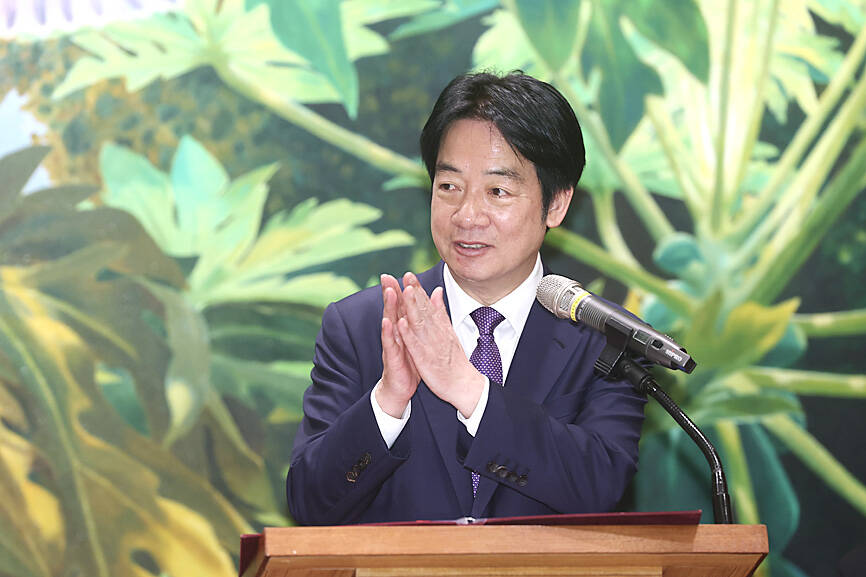US President Donald Trump’s tariff and trade policies announced earlier this month would significantly affect global supply chains, although Taiwan would use the opportunity to bolster bilateral trade relations and economic cooperation, President William Lai (賴清德) said yesterday during a meeting with the Taiwanese Chambers of Commerce North America at the Presidential Office.
Lai praised the organization for playing a vital role in bridging the gap between Taiwanese businesses and markets across the Pacific, improving US-Taiwan economic relations and deepening interpersonal relationships.
The chambers have sent a delegation to Taiwan every year since their establishment in 1988.

Photo: CNA
The organization sent a group to Washington to lobby top US Congress members on five major policies related to Taiwanese trade, economics and national defense, Lai said.
He thanked the organization for its efforts, which were largely supported by members of the US Congress.
In the face of a rapidly shifting global landscape, Taiwan needs even more support from the chambers to speak up for Taiwanese interests, he said.
In light of Trump’s plans to impose a 32 percent tariff on Taiwanese goods, the government has established a task force to enter negotiations with Washington, Lai said.
The government also plans to provide a support package of 20 measures across nine focus areas to protect the interests of Taiwanese industries and prop up domestic businesses that would be most affected by the tariffs, he said.
Lai said he hopes that overseas Taiwanese businesses can provide advice and assistance in leveraging new global supply chains and enhancing Taiwan-US cooperation, he added.
Lai said he and Premier Cho Jung-tai (卓榮泰) have spent the past two weeks touring businesses around Taiwan to hear the opinions of industry leaders and ensure that government policies can offer support where it is most needed.
Negotiations are under way and progressing smoothly between Taiwan and the US regarding tariffs, Minister of Foreign Affairs Lin Chia-lung (林佳龍) said yesterday morning in an interview before reporting to the Legislative Yuan’s Foreign Affairs and National Defense Committee.
The Taipei Economic and Cultural Representative Office, Taiwan’s de facto embassy in the US, has established communication channels with the US Department of State and the US trade representative, while officials, including Representative to the US Alexander Yui (俞大?) are engaging in intensive discussions, he said.
Points of negotiation include tariffs, non-tariff trade barriers and issues related to investment, procurement and export controls, he added.
The government would also monitor negotiations between the US and Japan and other countries that have been subject to the new tariffs to inform its discussions with the US, he said.
In related news, Wyoming Governor Mark Gordon is leading a trade delegation to Taiwan, which arrived on Saturday and is to depart today.
The Wyoming Energy Authority is to sign a memorandum of understanding with the Taiwan Association of Quantum Computing and Information Technology to initiate bilateral cooperation in quantum technology development.
The delegation would also engage in discussions on Taiwan-US trade, particularly as it relates to projects and exchanges with Wyoming, Lin said.
Additional reporting by Huang Ching-hsuan

Chinese spouse and influencer Guan Guan’s (關關) residency permit has been revoked for repeatedly posting pro-China videos that threaten national security, the National Immigration Agency confirmed today. Guan Guan has said many controversial statements in her videos posted to Douyin (抖音), including “the red flag will soon be painted all over Taiwan” and “Taiwan is an inseparable part of China,” and expressing hope for expedited reunification. The agency last year received multiple reports alleging that Guan Guan had advocated for armed reunification. After verifying the reports, the agency last month issued a notice requiring her to appear and explain her actions. Guan

GIVE AND TAKE: Blood demand continues to rise each year, while fewer young donors are available due to the nation’s falling birthrate, a doctor said Blood donors can redeem points earned from donations to obtain limited edition Formosan black bear travel mugs, the Kaohsiung Blood Center said yesterday, as it announced a goal of stocking 20,000 units of blood prior to the Lunar New Year. The last month of the lunar year is National Blood Donation Month, when local centers seek to stockpile blood for use during the Lunar New Year holiday. The blood demand in southern Taiwan — including Tainan and Kaohsiung, as well as Chiayi, Pingtung, Penghu and Taitung counties — is about 2,000 units per day, the center said. The donation campaign aims to boost

The Kaohsiung Tourism Bureau audited six hotels in an effort to prevent price gouging ahead of Korean band BTS’ concert tour in the city scheduled for Nov. 19, 21 and 22 this year. The bureau on Friday said that the audits — conducted in response to allegations of unfair pricing posted on social media — found no wrongdoing. These establishments included the local branches of Chateau de Chine, Hotel Nikko, My Humble House, and Grand Hai Lai, it said, adding that the Consumer Protection Commission would have penalized price gougers had the accusations been substantiated. The bureau said the Tourism Development Act

The Central Weather Administration (CWA) said a magnitude 4.9 earthquake that struck off the coast of eastern Taiwan yesterday was an independent event and part of a stress-adjustment process. The earthquake occurred at 4:47pm, with its epicenter at sea about 45.4km south of Yilan County Hall at a depth of 5.9km, the CWA said. The quake's intensity, which gauges the actual effects of a temblor, was highest in several townships in Yilan and neighboring Hualien County, where it measured 4 on Taiwan's seven-tier intensity scale, the CWA said. Lin Po-yu (林柏佑), a division chief at the CWA's Seismological Center, told a news conference